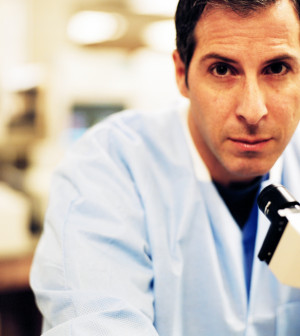- Double Mastectomy May Offer No Survival Benefit to Women With Breast Cancer
- Toxic Lead Found in Cinnamon Product, FDA Says
- Certain Abbott Blood Sugar Monitors May Give Incorrect Readings
- Athletes Can Expect High Ozone, Pollen Counts for Paris Olympics
- Fake Oxycontin Pills Widespread and Potentially Deadly: Report
- Shingles Vaccine Could Lower Dementia Risk
- Your Odds for Accidental Gun Death Rise Greatly in Certain States
- Kids From Poorer Families Less Likely to Survive Cancer
- Tough Workouts Won’t Trigger Cardiac Arrest in Folks With Long QT Syndrome
- At-Home Colon Cancer Test Can Save Lives
Your Smartphone Carries Your Personal Bacteria


Your smartphone is personalized in a surprising way: It carries the same types of bacteria you have on your body, which suggests the devices could be used as bacterial and health sensors, a new study says.
Trillions of microorganisms, including bacteria, live on and in your body, some of them harmful, but many of them beneficial.
Researchers assessed the microbiological connection between 17 people and their smartphones by analyzing bacteria on their hands and on the touch screens of their phones.
Eighty-two percent of the most common bacteria on the participants’ fingers were also found on their smartphones. The link was stronger for women than for men, according to the study published online June 24 in the journal PeerJ.
“The sample size was small, but the findings, while intuitive, were revealing,” lead author James Meadow, a postdoctoral researcher in the Biology and the Built Environment Center at the University of Oregon, said in a journal news release.
“This project was a proof-of-concept to see if our favorite and most closely held possessions microbially resemble us. We are ultimately interested in the possibility of using personal effects as a noninvasive way to monitor our health and our contact with the surrounding environment,” he said.
For example, technology could be developed to screen the smartphones of health care workers and hospital visitors, rather than the people themselves, for possible exposure to harmful bacteria and viruses they may carry into or out of a health facility, the researchers said.
Microbiological analysis of smartphones might also reveal whether their users have been exposed to “biological threats or unusual sources of environmental microbes that don’t necessarily end up integrated into our human microbiome,” the researchers wrote.
More information
The U.S. National Institutes of Health has more about your microbes and you.
Source: HealthDay
Copyright © 2024 HealthDay. All rights reserved.










